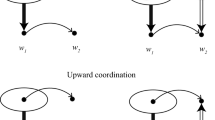Abstract
Reasoning with uncertain information is a central issue for Artificial Intelligence and Information Systems. Consequently, a vast amount of studies and results devoted to this issue can be found in the literature.
Curiously, reasoning with information whose uncertaintyvaries along time cannot be found so much in the literature. Dynamic reliability is a feature found rather frequently in many problems, e.g. in financial markets, meteorology and demographics.
In this article we consider propositions whose information about truth evaluation is gradually lost with time. Our motivation has come from the information system under development within the project SIDAM—Distributed Information Systems for Mobile Agents (supported by FAPESP, grant 98/06138-2)—to provide citizens with information about urban automotive traffic in a large city.
We propose functions of loss of information, and show how they can be used to characterize the obsolescence of propositional information in a logical system.
Similar content being viewed by others
References
F. Bacchus, Representing and Reasoning with Probabilistic Knowledge, MIT Press, 1990.
R. Buxton, “Modelling uncertainty in expert systems,” International Journal of Man-Machine Studies, vol. 31, pp. 415–476 (1999).
D.A. Clark, “Numerical and symbolic approaches to uncertainty management in AI,” Artificial Intelligence Review, vol. 4, pp. 109–146, 1990.
F.S. Corrêa da Silva, “Automated reasoning with uncertainties, PhD thesis, University of Edinburgh, Scotland, 1992.
F.S. Corrêa da Silva, Formalizations of uncertain reasoning (extended abstract–invited speaker), in edited by Imam, I. F., Kodratoff, Y., El-Dessouki, A., Ali, M. (eds.), 12th International Conference on Industrial and Engineering Applications of Artificial Intelligence and Expert Systems, Springer-Verlag LNAI 1611, pp. 1–3, 1999.
F.S. Corrêa da Silva, D.S. Robertson, and J. Hesketh, “Automated reasoning with uncertainties.” chapter 5 of Knowledge Representation and Uncertainty, edited by M. Masuch and L. Pawlos, Springer Verlag LNAI 808, 1993.
F.S. Corrêa da Silva, “On proof- and Model-based techniques for reasoning with uncertainty,” International Journal of Intelligent Systems, vol. 10, pp. 561–570, 1995.
F.S. Corrêa da Silva, “On reasoning with and reasoning about uncertainty in artificial intelligence,” in Proceedings of European Summer Meeting of the Association of Symbolic Logic, 1996.
F.S. Corrêa da Silva, D.V. Carbogim, “Facts, annotations, arguments, and reasoning,” New Generation Computing, vol. 19(1), pp. 1–22 (2001).
F.S. Corrêa da Silva and S.A. Vitorio, “Remarks on reasoning with progressively obsolete information. Proceedings of the Brazilian Symposium of Artificial Intelligence/Ibero-American Conference of Artificial Intelligence, 2000.
F. Esteva, P. Garcia, L. Godo, and R. Rodriguez, “A modal account of similarity-based reasoning,” International Journal of Approximate Reasoning, vol. 16, pp. 235–260, 1997.
D. Dubois, H. Prade, F. Esteva, P. Garcia, and L. Godo, “A logical approach to interpolation based on similarity relations,” International Journal of Approximate Reasoning, vol. 17, pp. 1–36, 1997.
F. Esteva, P. Garcia, and L. Godo, “Similarity-based reasoning discovering worlds with fuzzy logic: Perspectives and approaches to formalization of human-consistent logical systems, edited by V. Novak and I. Perfilieva, Springer Verlag 2000.
M. Endler, D.M. Silva, F. Silva e Silva, R.A. Rocha, and M.A. Moura, “Project SIDAM: Overview and preliminary results,” Annals of 2nd Workshop on Wireless Communications, in 2000, Brazil.
S.A. Vitorio, “Obsolescencia de Informacao,” MSc dissertation, Department of Computer Science, University of Sao Paulo (2000), Brazil.
Author information
Authors and Affiliations
Corresponding author
Rights and permissions
About this article
Cite this article
Silva, F.S.C.d. Towards a Logic of Perishable Propositions. Appl Intell 23, 121–130 (2005). https://doi.org/10.1007/s10489-005-3417-6
Issue Date:
DOI: https://doi.org/10.1007/s10489-005-3417-6




